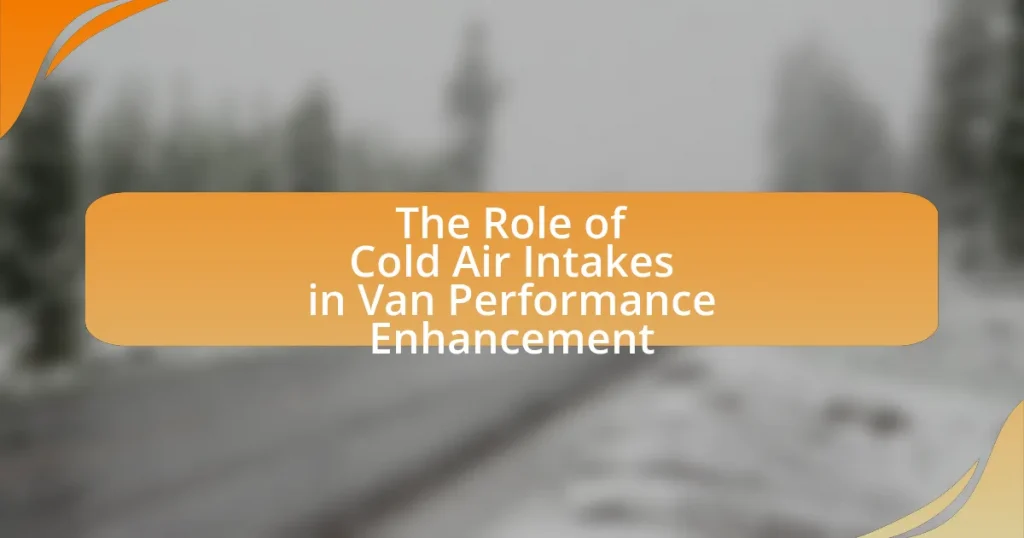Regular engine checks are essential for maintaining the performance and reliability of tuned vans, which often operate under higher stress conditions due to modifications aimed at enhancing power and efficiency. These checks help identify potential issues such as overheating, fuel system malfunctions, and exhaust leaks, which can arise from tuning. Neglecting regular inspections can lead to severe mechanical failures, reduced performance, and increased emissions, ultimately resulting in costly repairs and safety risks. Key components to monitor during engine checks include oil and coolant levels, air and fuel filters, and spark plugs, all of which are critical for ensuring optimal engine function and longevity. Regular maintenance practices, including the use of diagnostic tools, are vital for preserving the enhanced capabilities of tuned vans and preventing significant damage.

What is the importance of regular engine checks in tuned vans?
Regular engine checks in tuned vans are crucial for maintaining optimal performance and reliability. These checks ensure that modifications made to enhance power and efficiency do not lead to mechanical failures or reduced lifespan of engine components. For instance, tuned vans often operate under higher stress conditions, making them more susceptible to issues like overheating or component wear. Regular inspections can identify potential problems early, allowing for timely repairs and adjustments, which ultimately prolongs the vehicle’s operational life and enhances safety.
Why are engine checks crucial for tuned vans?
Engine checks are crucial for tuned vans because they ensure optimal performance and reliability of modified components. Regular inspections help identify potential issues such as engine overheating, fuel system malfunctions, or exhaust leaks, which can arise from tuning modifications. For instance, a study by the Society of Automotive Engineers highlights that 30% of performance-related failures in modified vehicles are linked to inadequate maintenance practices. Therefore, consistent engine checks not only enhance the longevity of tuned vans but also maintain safety and efficiency on the road.
What specific risks are associated with neglecting engine checks in tuned vans?
Neglecting engine checks in tuned vans poses significant risks, including engine failure, reduced performance, and increased emissions. Engine failure can occur due to overlooked issues such as oil degradation or coolant leaks, which can lead to costly repairs or total engine replacement. Reduced performance is often a result of improper tuning or wear on engine components, which can diminish fuel efficiency and power output. Additionally, increased emissions can result from unmonitored engine conditions, leading to environmental violations and potential fines. Regular engine checks are essential to mitigate these risks and ensure optimal vehicle operation.
How do regular engine checks enhance performance in tuned vans?
Regular engine checks enhance performance in tuned vans by ensuring optimal engine efficiency and reliability. These checks identify potential issues such as fuel system inefficiencies, ignition problems, or air intake restrictions, which can hinder performance. For instance, a study by the Society of Automotive Engineers found that regular maintenance can improve fuel efficiency by up to 15%, directly impacting the overall performance of tuned vehicles. Additionally, timely detection of wear and tear on components like spark plugs and filters allows for corrective actions that maintain the enhanced capabilities of tuned vans, ensuring they operate at their best.
What are the key components of engine checks for tuned vans?
The key components of engine checks for tuned vans include the assessment of engine oil levels, coolant levels, air and fuel filters, spark plugs, and the exhaust system. Regularly checking engine oil levels ensures proper lubrication and prevents engine wear, while monitoring coolant levels helps maintain optimal operating temperatures. Inspecting air and fuel filters guarantees efficient airflow and fuel delivery, which is crucial for performance in tuned vans. Additionally, examining spark plugs can reveal issues with ignition efficiency, and assessing the exhaust system ensures that emissions are within legal limits and that performance is not hindered. These components are essential for maintaining the performance and reliability of tuned vans.
Which engine parts should be inspected regularly in tuned vans?
Regular inspections of engine parts in tuned vans should focus on the following components: the air filter, fuel injectors, spark plugs, and the engine oil. The air filter ensures optimal airflow to the engine, while clean fuel injectors are crucial for proper fuel atomization and combustion efficiency. Spark plugs ignite the air-fuel mixture, and their condition directly affects engine performance. Regularly checking engine oil levels and quality is essential for lubrication and preventing engine wear. These inspections help maintain performance and reliability in tuned vans, as neglecting them can lead to decreased efficiency and potential engine damage.
How does the tuning of a van affect the engine check process?
Tuning a van alters its engine performance parameters, which directly impacts the engine check process. When a van is tuned, modifications such as changes to the air-fuel mixture, ignition timing, and exhaust flow can lead to different operational characteristics that may trigger engine check lights or fault codes. For instance, if the tuning results in a richer fuel mixture, it may cause increased emissions, prompting the vehicle’s onboard diagnostics system to flag an issue during routine checks. Additionally, tuning can affect sensor readings, leading to potential misinterpretations by the engine control unit, which can complicate the diagnostic process.
What are the consequences of skipping regular engine checks?
Skipping regular engine checks can lead to severe mechanical issues, reduced performance, and increased repair costs. Without routine inspections, minor problems such as oil leaks or worn belts can escalate into major failures, potentially resulting in engine damage or complete breakdown. For instance, the American Automobile Association (AAA) reports that neglecting maintenance can lead to a 30% increase in repair costs over time. Additionally, skipping checks can compromise fuel efficiency, leading to higher fuel consumption and emissions, which negatively impacts both the environment and the owner’s wallet. Regular engine checks are essential for ensuring optimal performance and longevity of the vehicle.
How can neglecting engine checks lead to costly repairs?
Neglecting engine checks can lead to costly repairs due to the accumulation of undetected issues that escalate over time. When regular inspections are skipped, minor problems such as oil leaks, worn belts, or faulty sensors can worsen, resulting in significant engine damage. For instance, a small oil leak can lead to engine overheating, which may require a complete engine rebuild, costing thousands of dollars. According to the American Automobile Association, preventative maintenance can save vehicle owners up to 50% on repair costs by addressing issues before they become severe. Therefore, consistent engine checks are essential to avoid expensive repairs and ensure the longevity of tuned vans.
What impact does skipping checks have on vehicle safety?
Skipping checks significantly compromises vehicle safety by increasing the likelihood of mechanical failures and accidents. Regular checks ensure that critical components, such as brakes, tires, and engine systems, are functioning properly; neglecting these inspections can lead to undetected issues that may result in breakdowns or collisions. For instance, the National Highway Traffic Safety Administration reports that vehicle maintenance issues contribute to approximately 20% of all crashes. Therefore, skipping checks not only endangers the driver and passengers but also poses risks to other road users.

How can regular engine checks improve the longevity of tuned vans?
Regular engine checks can significantly enhance the longevity of tuned vans by ensuring optimal performance and early detection of potential issues. These checks allow for the monitoring of critical components such as the engine, transmission, and exhaust systems, which are often modified in tuned vans. By identifying wear and tear or malfunctions early, regular inspections can prevent more severe damage that could lead to costly repairs or complete engine failure. For instance, a study by the Society of Automotive Engineers indicates that routine maintenance can extend vehicle lifespan by up to 30%. This proactive approach not only maintains the efficiency of the tuned modifications but also ensures that the van operates within safe parameters, ultimately prolonging its operational life.
What maintenance practices should be followed for tuned vans?
Regular maintenance practices for tuned vans include frequent engine checks, monitoring fluid levels, and ensuring proper tire pressure. Engine checks should focus on tuning parameters, such as air-fuel mixture and ignition timing, to maintain optimal performance. Fluid levels, including oil, coolant, and transmission fluid, must be regularly inspected and topped off to prevent overheating and mechanical failure. Additionally, tire pressure should be checked to ensure safety and improve fuel efficiency, as improper tire pressure can affect handling and performance. These practices are essential for preserving the enhanced capabilities of tuned vans and preventing costly repairs.
How often should engine checks be performed on tuned vans?
Engine checks on tuned vans should be performed every 3,000 to 5,000 miles or every three to six months, depending on usage and modifications. Regular checks are crucial because tuned vans often operate under higher stress conditions, which can lead to increased wear and potential issues. According to automotive maintenance guidelines, frequent inspections help identify problems early, ensuring optimal performance and longevity of the vehicle.
What tools are essential for conducting engine checks on tuned vans?
Essential tools for conducting engine checks on tuned vans include an OBD-II scanner, a multimeter, a compression tester, and a vacuum gauge. The OBD-II scanner allows for the diagnosis of engine codes and monitoring of performance metrics, which is crucial for tuned vehicles that may have modified engine parameters. A multimeter is necessary for checking electrical systems and ensuring proper voltage and current flow, which can be affected by tuning modifications. A compression tester assesses the engine’s internal health by measuring cylinder pressure, while a vacuum gauge helps diagnose issues related to air intake and exhaust flow, both of which are critical in tuned engines. These tools collectively enable thorough and accurate engine assessments, ensuring optimal performance and reliability.
How do engine checks affect fuel efficiency in tuned vans?
Regular engine checks significantly enhance fuel efficiency in tuned vans by ensuring optimal performance and identifying issues that may hinder efficiency. These checks involve inspecting components such as the fuel system, air intake, and exhaust, which directly influence how effectively fuel is burned. For instance, a clean air filter can improve airflow, leading to better combustion and increased fuel economy. Additionally, diagnosing and fixing problems like fuel leaks or misfiring spark plugs can prevent excessive fuel consumption. Studies indicate that well-maintained engines can achieve up to 15% better fuel efficiency compared to poorly maintained ones, underscoring the critical role of regular engine checks in maximizing fuel economy in tuned vans.
What role does engine tuning play in fuel consumption?
Engine tuning significantly influences fuel consumption by optimizing the air-fuel mixture and improving combustion efficiency. When an engine is properly tuned, it can achieve better performance and lower fuel consumption, as evidenced by studies showing that a well-tuned engine can improve fuel efficiency by up to 10%. This optimization reduces excess fuel usage and emissions, leading to a more economical and environmentally friendly operation.
How can regular checks optimize fuel efficiency in tuned vans?
Regular checks can optimize fuel efficiency in tuned vans by ensuring that all engine components are functioning correctly and efficiently. These checks can identify issues such as air filter blockages, fuel injector malfunctions, or improper tire pressure, which can negatively impact fuel consumption. For instance, a clean air filter can improve airflow to the engine, enhancing combustion efficiency and potentially increasing fuel economy by up to 10%. Additionally, regular checks can help maintain optimal tuning settings, which are crucial for maximizing performance and efficiency in modified engines. By addressing these factors proactively, tuned vans can achieve better fuel efficiency and lower operational costs.

What are the best practices for conducting engine checks in tuned vans?
The best practices for conducting engine checks in tuned vans include performing regular inspections of engine components, monitoring fluid levels, and utilizing diagnostic tools to assess performance. Regular inspections should focus on checking the condition of the air filter, spark plugs, and fuel injectors, as these components can significantly affect engine efficiency and performance in tuned vans. Monitoring fluid levels, such as oil, coolant, and transmission fluid, is crucial to prevent overheating and ensure optimal operation. Additionally, using diagnostic tools like OBD-II scanners can help identify any error codes or performance issues, allowing for timely maintenance and adjustments. These practices are essential for maintaining the enhanced performance and reliability of tuned vans, as neglecting engine checks can lead to decreased efficiency and potential engine damage.
What steps should be taken during an engine check?
During an engine check, the following steps should be taken: inspect the oil level and quality, check the coolant level, examine the air filter, assess the fuel system, inspect belts and hoses for wear, and review the battery condition. Each of these steps is crucial for maintaining engine performance and longevity. For instance, low oil levels can lead to engine wear, while a clogged air filter can reduce efficiency. Regular checks help identify potential issues before they escalate, ensuring the engine operates optimally and reducing the risk of costly repairs.
How can owners ensure they are thorough in their engine checks?
Owners can ensure they are thorough in their engine checks by following a systematic checklist that includes inspecting oil levels, coolant levels, air filters, and belts. Regularly checking these components helps identify potential issues before they escalate, thereby maintaining engine performance and longevity. According to the American Automobile Association, neglecting routine checks can lead to engine failure, which is often preventable through diligent maintenance practices.
What common mistakes should be avoided during engine checks?
Common mistakes to avoid during engine checks include neglecting to check fluid levels, overlooking visual inspections for leaks or wear, and failing to follow the manufacturer’s maintenance schedule. Neglecting fluid levels can lead to engine overheating or damage, as proper lubrication is essential for engine function. Overlooking visual inspections may result in undetected issues that could escalate into major repairs. Lastly, not adhering to the manufacturer’s maintenance schedule can void warranties and lead to premature engine failure, as regular checks are designed to catch problems early.
What resources are available for learning about engine checks in tuned vans?
Resources available for learning about engine checks in tuned vans include online forums, manufacturer manuals, and specialized automotive websites. Online forums such as VWVortex and Reddit’s r/vans provide community-driven insights and shared experiences regarding engine maintenance. Manufacturer manuals offer specific guidelines tailored to each van model, detailing recommended checks and procedures. Specialized automotive websites like Car and Driver and MotorTrend feature articles and tutorials on engine tuning and maintenance, often including expert advice and step-by-step guides. These resources collectively provide comprehensive knowledge essential for maintaining the performance and reliability of tuned vans.
Where can owners find reliable information on engine maintenance?
Owners can find reliable information on engine maintenance through official manufacturer websites, automotive repair manuals, and reputable automotive forums. Manufacturer websites often provide detailed maintenance schedules and guidelines specific to each vehicle model, ensuring that owners have access to accurate and relevant information. Automotive repair manuals, such as those published by Haynes or Chilton, offer comprehensive instructions and troubleshooting tips for various engine maintenance tasks. Additionally, reputable automotive forums, where experienced mechanics and enthusiasts share their knowledge, can serve as valuable resources for practical advice and real-world experiences related to engine maintenance.
What role do professional mechanics play in engine checks for tuned vans?
Professional mechanics are essential for conducting engine checks on tuned vans, as they possess the specialized knowledge and skills required to assess modifications and ensure optimal performance. Their expertise allows them to identify potential issues that may arise from tuning, such as improper fuel mixtures or inadequate cooling systems, which can lead to engine damage. Furthermore, mechanics utilize diagnostic tools and techniques to evaluate the engine’s performance metrics, ensuring that the modifications comply with safety and regulatory standards. This role is critical, as regular engine checks by qualified professionals can prevent costly repairs and enhance the longevity of tuned vans.
What are some practical tips for maintaining tuned vans effectively?
To maintain tuned vans effectively, perform regular engine checks, monitor fluid levels, and ensure proper tire maintenance. Regular engine checks help identify performance issues early, which is crucial for tuned vehicles that often operate under higher stress. Monitoring fluid levels, including oil, coolant, and transmission fluid, prevents overheating and mechanical failures. Proper tire maintenance, including checking pressure and tread depth, enhances safety and performance, as tuned vans may experience different handling characteristics compared to standard models. These practices are essential for ensuring longevity and optimal performance in tuned vans.



